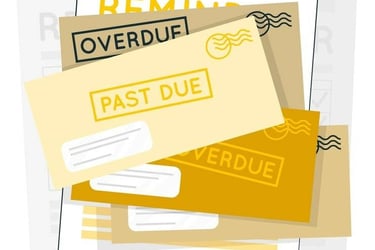Managing Late Rent Payments in Maryland: Best Practices for Landlords
Image: Freepix
Late rent payments are a common challenge for landlords, and navigating this issue requires a blend of legal knowledge and effective communication. In Maryland, the process for handling late payments is regulated by state law, but landlords still have room for flexibility in how they approach the situation. By following best practices, landlords can ensure they stay within the law while maintaining a professional relationship with their tenants.
1. Know the Lease Agreement Inside and Out
The first step to managing late rent payments effectively is to have a well-drafted lease agreement. This agreement should clearly outline the due date for rent, the grace period (if any), late fees, and other terms related to payment. Maryland law does not impose a mandatory grace period before a landlord can charge a late fee, but many landlords include one in the lease—typically 5-7 days.
By ensuring that all payment terms are clearly defined in the lease, landlords reduce confusion and make it easier to address any late payments when they occur.
2. Understand Late Fees and the Law
In Maryland, landlords can charge a late fee if rent is not paid on time. However, the fee must be reasonable and outlined in the lease agreement. While there is no specific maximum limit on late fees set by Maryland law, they should not be excessive. A common fee is 5-10% of the monthly rent.
Make sure that the late fee structure is clearly specified in the lease agreement. If the tenant is behind on rent, apply the late fee as outlined. If no fee is stipulated in the lease, the landlord may not charge one unless agreed upon separately with the tenant.
3. Send a Notice of Late Payment
Once a payment is late, it’s important to send a formal written notice to the tenant. This notice should include the following:
The amount of rent due
The date the rent was due
Any applicable late fees
A reminder of the consequences of continued non-payment
This notice serves as a formal record of the issue and reminds the tenant of their responsibilities. If the tenant continues to fail to pay, it can be used as part of the documentation should the landlord need to pursue eviction.
4. Consider Offering a Payment Plan
In many cases, tenants may be struggling financially, and offering a payment plan can help them get back on track while maintaining a positive relationship. If you believe the tenant intends to pay but is facing short-term difficulties, offering a structured payment plan could resolve the situation without having to escalate it further.
Be sure to put any agreements in writing and keep a record of the arrangement. If the tenant breaks the agreement, you can proceed with other options as outlined in the lease.
5. Send a Final Notice
If the tenant still fails to make the payment or adhere to the payment plan after the initial late payment notice, it's time to send a final notice. This is typically known as a "Notice of Intent to File for Eviction." This notice lets the tenant know that, unless they pay the overdue rent or come to a resolution, the landlord intends to begin the eviction process.
It’s important to keep in mind that in Maryland, landlords must give a 30-day notice before proceeding with an eviction lawsuit for non-payment of rent.
6. Filing for Eviction
If the tenant still hasn’t paid after the final notice, landlords can file for eviction in the District Court. In Maryland, this is done by filing a "Complaint for Failure to Pay Rent." The court will schedule a hearing where both the landlord and tenant can present their case.
At the hearing, the tenant can present reasons for the non-payment, and the landlord can show that the tenant is in breach of the lease agreement. If the court rules in the landlord’s favor, an eviction order will be issued.
7. Eviction Process
Once the court grants an eviction order, the landlord cannot take matters into their own hands. In Maryland, self-help evictions (such as changing locks or removing the tenant’s property) are illegal. Instead, the landlord must contact the sheriff’s office to enforce the eviction. The sheriff will serve the tenant with a writ of possession and set a date for the physical eviction, if necessary.
8. Security Deposit Considerations
If the tenant owes rent and has vacated the property, you may be tempted to withhold the security deposit to cover unpaid rent. Maryland law allows landlords to withhold part or all of the security deposit to cover unpaid rent, damages, and other charges.
However, landlords must provide an itemized list of any deductions from the security deposit within 45 days of the tenant moving out. Failing to do so can result in penalties and the return of the full deposit, regardless of the tenant’s unpaid rent.
9. Communication is Key
Throughout the process, maintaining open and professional communication with tenants is essential. Many tenants want to pay but are facing financial hardships, and addressing issues with empathy can lead to mutually beneficial resolutions. At the same time, make sure you are enforcing the lease terms and protecting your rights as a landlord.
Conclusion
Dealing with late rent payments can be stressful, but with clear policies in place and a solid understanding of Maryland's laws, landlords can handle the situation fairly and effectively. The key to success is clear communication, documentation, and understanding both your rights and your responsibilities. By following these best practices, you can minimize the impact of late payments and preserve the financial health of your rental business.
If you need assistance with notices or legal documentation, it's always a good idea to consult a local attorney who specializes in landlord-tenant law.
For more information on properties located in Baltimore, MD, click here.




